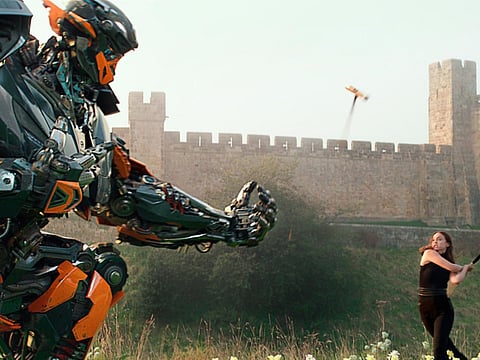Hollywood reels from summer box office flops
As the Toronto International Film Festival gets underway, a historically bad movie summer gives way to a cautiously promising autumn

Have you heard? Hollywood just suffered a historically bad summer, with the US box office plummeting by 16 per cent compared with last year. Attendance hit a 25-year low. This past Labor Day weekend in the US was the worst in two decades and served as an appropriate capper to what all agreed was a season of dismal underperformers and outright duds.
When the sad history of the Summer of ‘17 is written, special mention will surely be made of misbegotten enterprises such as King Arthur: Legend of the Sword and Valerian and the City of a Thousand Planets, two notably lame attempts at mining popular source material — medieval folk legend and a comic book, respectively — for their franchise potential.
Their swift demise — along with the tanking of The Mummy and the latest Pirates of the Caribbean and Transformers movies — indicated that the studios’ old assumptions about fans showing up regardless of the quality of the movie no longer hold. Even War for the Planet of the Apes, Matt Reeves’ emotionally involving, visually impressive chapter of the rebooted series, failed to connect, suggesting that fatigue has finally set in among sequel-weary viewers.
SUMMER LESSONS
The fate of War for the Planet of the Apes gets to a fundamental contradiction of the past few months: Business might have been terrible, but the movies themselves were often pretty good, if not great.
In the comic-book world, both Wonder Woman and Spider-Man: Homecoming brought vitality and rich production values into a genre that is showing signs of wear.
Strong returns for Christopher Nolan’s structurally novel, cinematically lush Second World War epic Dunkirk, Edgar Wright’s snappy crime musical Baby Driver and Taylor Sheridan’s moody thriller Wind River proved that well-executed original ideas hold far more promise than facile Baywatch adaptations.
The summer’s most crowd-pleasing sleeper hits, Girls Trip and The Big Sick, as well as a steady performer like the provocative chamber piece Beatriz at Dinner, showed that originality plus inclusivity can be a winning proposition.
The lessons Hollywood will take away from this summer are open to interpretation. If Americans are showing signs of sequel-itis, foreign markets still seem game. It was international performance that saved such films as The Mummy and the Pirates and Transformers films from complete disaster.
Still, studios surely took heed when a Chinese production, not an American one, dominated that country’s enormous and growing film market. (The movie, a patriotic action thriller called World Warrior 2, had only a limited release in the US.)
COMPETITION INCREASES
During a summer when hurricanes, super-hyped prizefights, Game of Thrones finales and reality show-worthy political drama competed for filmgoers’ attention, quality and originality helped, but might not have been enough: Reportedly, Comcast, Apple and Amazon are close to launching a $30-per-month (Dh110.1) premium video-on-demand rental system that will allow viewers to rent select titles 30 to 45 days after they appear in theatres. According to the Hollywood Reporter, the system could be in place as early as next year.
Presumably, the movies eligible for premium VOD wouldn’t be spectacles on a par with Dunkirk — or even Get Out and Girls Trip, which also epitomised the kind of film that becomes exponentially more enjoyable when it’s seen with a crowd.
But it might find success with viewers frustrated with the drought-or-flood pattern of speciality releases, which tend to flow into theatres during the summer as counterprogramming to the big tentpoles, and then hit fire hose levels during awards season.
For every hit like The Big Sick and modest success like Beatriz at Dinner, there are countless little-movies-that-could-but-didn’t, including the rap comedy-drama Patti Cake$ (playing in UAE cinemas) and David Lowery’s intriguing supernatural romance A Ghost Story.
WHAT’S IN STORE
The autumn looks even more crowded with prestige pictures that will be competing with the likes of comic book movies (Thor: Ragnarok, Justice League) and a Star Wars instalment (The Last Jedi) in the effort to coax filmgoers out of their appointment-viewing cocoons.
At the Toronto International Film Festival, which is underway, all-important awards buzz will begin in earnest for movies that have already played the festival circuit.
Movies arriving with the wind at their backs include Battle of the Sexes, about Bobby Riggs and Billie Jean King, Guillermo del Toro’s fantastical fable The Shape of Water, the Dunkirk movie Darkest Hour, starring Gary Oldman as Winston Churchill, Dee Rees’s 1940s rural drama Mudbound, the coming-of-age romance Call Me by Your Name and Greta Gerwig’s directorial debut Lady Bird, starring Saoirse Ronan.
Meanwhile, such Toronto premieres as Aaron Sorkin’s Molly’s Game, the Ben Stiller comedy Brad’s Status and the politics-adjacent dramas Chappaquiddick and Mark Felt: The Man Who Brought Down the White House will either find their own lane to go the distance or quickly fade.
Will the must-see film of the autumn be among them? An anxious industry watches and waits, hoping not only that the answer is yes, but that there will be far more than one.
Sign up for the Daily Briefing
Get the latest news and updates straight to your inbox



